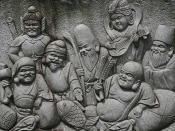Blaise Pascal's argument combines a rational equation with the Christian-Judeo view of God. The equation states courses of action, outcomes from those actions and assigns value and probability which yield expected utility from those actions. It is common sense that someone would want to choose the course of action with the highest expected utility, Pascal agrees. Whichever course of action yields the highest expected utility is in the best interest of whomever is acting. Thus, when applied to believing in God or not believing in God, says Pascal, one should believe because belief yields the highest expected utility: infinity.
Pascal's argument does seem completely rational. Pascal believes his argument should sway all rational people to believe in God as well. As Pascal sees it, the equation proves that believing in God is in one's best interest as well as a rational choice. He also believes that even if God does not exist, you are not losing that much in life by living the Christian lifestyle.
In that, you will be "faithful, honest, humble, grateful, generous, a sincere friend, truthful."� and you only lose "glory and luxury"�, which are "poisonous pleasures"�. Though Pascal calls his argument a "wager"�, so confident in the Christian religion is he that he states in fact, that by believing in God and living the Christian lifestyle, not only will you gain eternal bliss in heaven if God does indeed exist, you will gain all the joys of Christianity without risking much of anything. "You have wagered for something certain and infinite, for which you have given nothing."� Of course, many atheists would disagree with the above quote completely, which is probably why Pascal states it later, after giving his completely rational equation on why one should believe in God. Thus, Pascal thinks any rational being...


